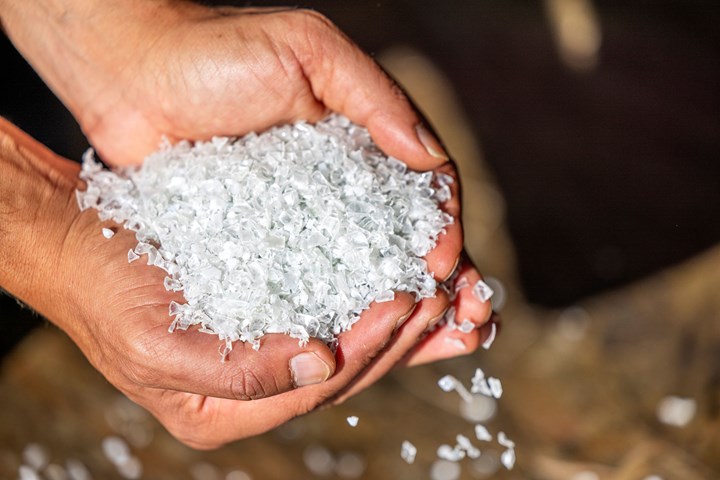Revalyu Breaks Ground on PET Recycling Facility in Georgia
Company expects new facility will be capable of chemically recycling 200 million pounds of post consumer PET per year.
Revalyu broke ground on its first recycling facility in the United States. The facility, located in Statesboro, Georgia, is expected to have an annual capacity to recycle 200 million pounds of polyethylene terephthalate (PET), according to the company.

Polyester flake from bottles. Photo Credit: Revalyu
Revalyu’s glycolysis process for recycling PET operates at lower temperatures than other chemical recycling technologies, and uses mono-ethylene glycol to depolymerize PET molecules into monomers.
Revalyu says its recycled PET is most frequently used by the textile industry for seamless knitting, weaving, denim, automotive, furniture or technical textile applications.
Currently in use at the company’s plant in India, the recycling process uses 75% less water and 91% less energy, compared with the production of virgin PET.
“Our first plant in the U.S. is a very important step for the global expansion of our company. Our existing and future U.S. customers have a huge demand for our 100% recycled pellets, which are equivalent in quality to conventional oil-based PET pellets. This advanced recycling plant will serve our customers directly from the U.S., enabling quicker transportation time, lower cost and a smaller CO2 footprint,” says Jan van Kisfeld, managing director at Revalyu.
The Georgia facility is expected to be complete in the third quarter of 2025.
Related Content
-
Polyethylene Fundamentals – Part 4: Failed HDPE Case Study
Injection molders of small fuel tanks learned the hard way that a very small difference in density — 0.6% — could make a large difference in PE stress-crack resistance.
-
Prices Up for All Volume Resins
First quarter was ending up with upward pricing, primarily due to higher feedstock costs and not supply/demand fundamentals.
-
Prices Up for PE, PP, PS, Flat for PVC, PET
Trajectory is generally flat-to-down for all commodity resins.















